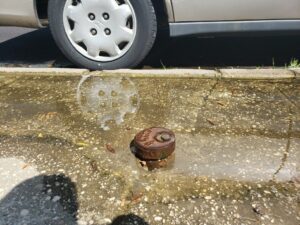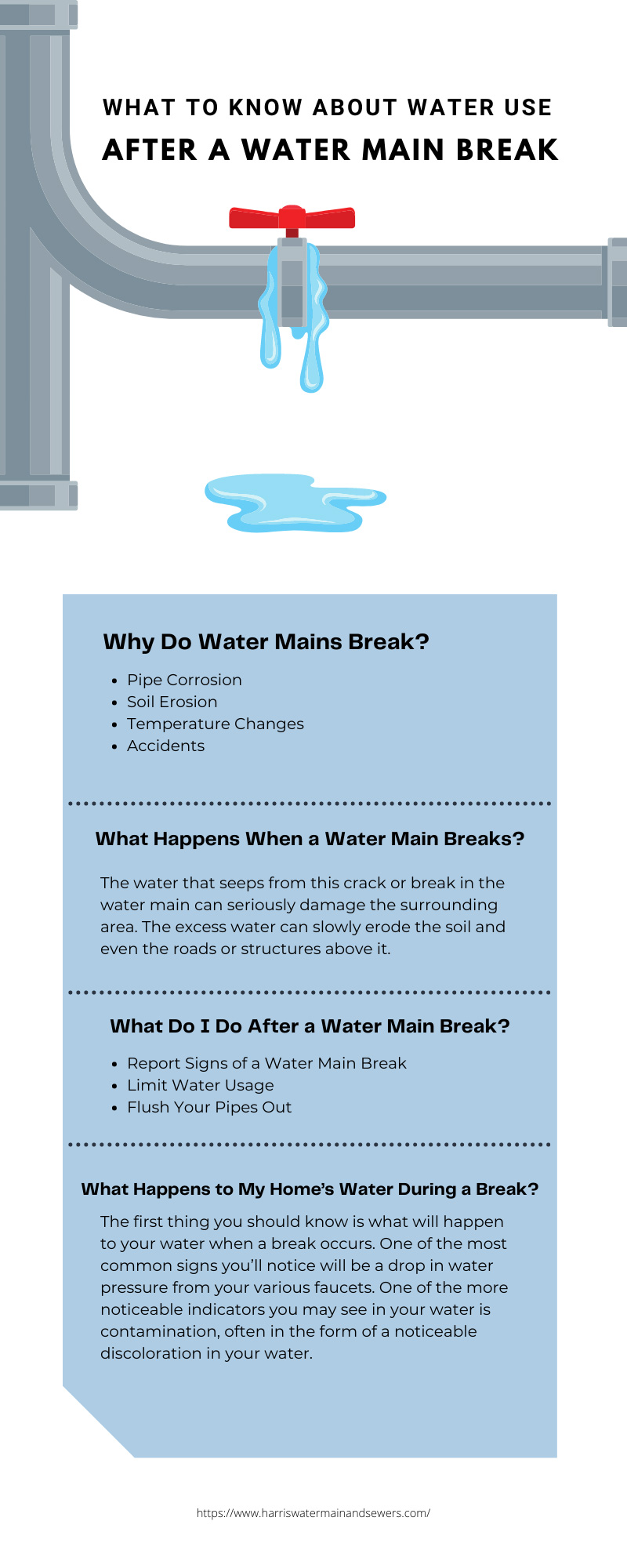If you’ve never been in the middle of a water main break before, a lot goes on that you might not be aware of. A break in a water main is a serious problem that requires a quick reaction, efficient work, and knowing what to do when it happens to you. Water main breaks can greatly affect the water in your home for a certain period. During that time, it will be our responsibility to fix the water main, but it’ll be your responsibility to take care of your water usage while we work.
New York City has one of the most expansive and complex systems for transferring water from one place to another. Water main breaks aren’t common, but they do happen occasionally, and you can’t simply ignore them when they happen. In this article, we’ll take you through what to know about water use after a water main break so that you can keep yourself and anyone you live with safe while the main is in the middle of repairs.
Why Do Water Mains Break?
There are several reasons why a water main might break. Most of these reasons involve either the material of the pipe itself or drastic changes in the environment surrounding the pipe. A number of human errors may factor in as well. Here are some of the most common reasons why water mains break:
- Pipe Corrosion – Depending on the material of the pipe in question, corrosion is a possible reason for a water main break. New York City requires the use of materials that are less susceptible to corrosion, such as copper and ductile iron, but they didn’t always.
- Soil Erosion – Factors such as nearby construction and past water issues can cause the soil surrounding the water main to erode, destabilizing the area around the water main and making it more likely to shift and break.
- Temperature Changes – Freezing temperatures can make the ground contract from the cold, putting more pressure on the outside of the water main. Conversely, excessively hot temperatures can cause the ground to shift, which can shear the water main.
- Accidents – Human error can also cause a break in a water main. Most often, this involves nearby construction and mistakes in the operation of heavy machinery on construction sites.
What Happens When a Water Main Breaks?
No matter what the reason for the water main break, the same thing will happen. The pipe breaks in one way or another, allowing water to leak and pour out of the newly developed opening. It’s understandable to think that this might immediately cut off the water supply as the water drains out of the crack, but water will still continue to flow forward, albeit with less pressure than before.
The water that seeps from this crack or break in the water main can seriously damage the surrounding area. The speed of this fallout depends on the size of the fissure, but even small ones can have a significant impact. The excess water can slowly erode the soil and even the roads or structures above it. In the worst cases, water might gush up from the ground, possibly even spraying upward.
What Happens to My Home’s Water During a Break?
So what do you need to know about water use after a water main break? The first thing you should know is what will happen to your water when a break occurs. One of the most common signs you’ll notice will be a drop in water pressure from your various faucets. If you have many faucets in your home, you may not notice a considerable change when just one is running. You may need to turn on multiple faucets to see a significant drop in water pressure.
One of the more noticeable indicators you may see in your water is contamination, often in the form of a noticeable discoloration in your water. If you happen to observe that your water looks dirty or has a rusty sort of color to it, immediately cease using that water in any way.
What Do I Do After a Water Main Break?
While it’s up to us here at Harris Main and Water Sewer Contractors to fix the water main itself, you can still do a few things to protect yourself and those you live with. It’s always important to keep a sharp eye on your water supply and stop using it if you notice any unpleasant changes. Here are some things steps you can take to help out and protect yourself.
Report Signs of a Water Main Break
If you notice any sign of what you think might be a water main break, report it to the city as soon as possible. Here are a few of the signs that you should look for:
- Your water is suddenly flowing much more slowly
- Your water looks dirty, has noticeable sediment, or has a rusty discoloration
- Your fixtures give off a noticeable popping or hissing sound
- You see flooding or pooling in the lower places of your home
Limit Water Usage
To keep yourself as safe as possible, limit your tap water use during a water main break. Avoid drinking tap water, taking a bath or shower, running your dishwasher, or using your washing machine. Your area may issue a boil water warning or alert, meaning you should boil any water you use for at least a few minutes to kill off any impurities that may make their way into the water supply.
Flush Your Pipes Out
Once we finish fixing the water main break, flush out your pipes as much as possible before you use them again. Starting with cold water, run your faucets for at least a few minutes. You want to keep an eye on it to make sure the water turns clear. Follow this up by repeating the process with hot water to flush out your hot water tanks. You may also want to run your dishwasher or washing machine empty a few times just to clear out any water lingering in them.
Whether it’s fixing water main breaks or doing water main pipe installation, Harris Main and Water Sewer Contractors are the New York City experts you can trust to do the job quickly and efficiently. We’ll be there to help when the worst comes to pass.





















